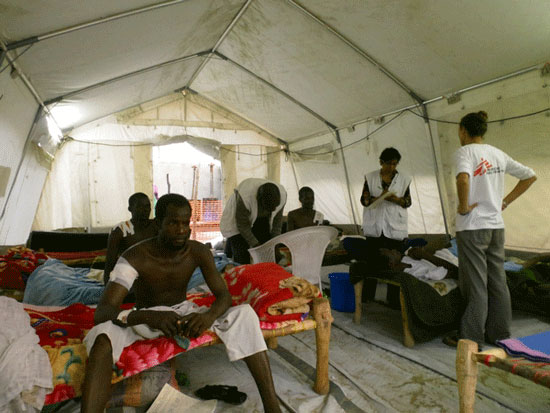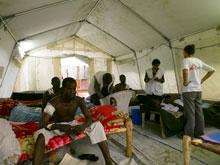MSF is responding to a fresh wave of violence that has broken out in some areas of Sudan's Darfur region along the border with Chad.

Chad 2013 © Max Gertler/MSF
MSF medical workers treat injured refugees at a clinic set up in Tissi, Chad.
TISSI, CHAD/NEW YORK, AUGUST 2, 2013—Doctors Without Borders/Médecins Sans Frontières (MSF) is responding to a fresh wave of violence that has broken out in some areas of Sudan's Darfur region along the border with Chad. In the past week, MSF teams have treated 30 new injured patients, 13 of whom suffered from gunshot wounds, and were evacuated to the nearby town of Abeche for emergency surgery. It is the largest wave of wounded MSF has seen in the last two months.
In April, MSF opened an emergency project in Tissi, in southeastern Chad, to provide medical and humanitarian assistance to Sudanese refugees and Chadian returnees affected by the fighting in Darfur. The humanitarian crisis is a direct result of the deteriorating security situation in some areas of central Darfur, which has displaced an estimated 50,000 people to Chad since the beginning of the year.
"In the past three months MSF has treated more than 80 patients for gunshot wounds,” said Jason Mills, MSF head of mission in Chad. “The level of violence is extremely concerning and our team is frequently working around the clock to stabilize and refer patients with severe injuries."
At its health facility in Tissi, in addition to the wounded, MSF has treated more than 3,500 people for ailments such as diarrhea, respiratory tract infections, and malnutrition. Because of the onset of the rainy season, the team is also worried about potential spikes in malaria cases. MSF is now holding malaria prevention sessions for local residents, and, with the help of a network of community health workers, is monitoring the general health situation for the local population in Tissi town, as well as returnees who have settled in surrounding villages.
A second MSF team is now providing primary health care in the Ab Gadam refugee camp, 20 kilometers [about 12 miles] west of Tissi, where 17,000 refugees have been relocated by the United Nations High Commission for Refugees. In early August, MSF will open an inpatient department to provide secondary health care in the camp for the next two months.
Due to the rain, poor road conditions have made it difficult for water trucks to reach the Ab Gadam camp, leaving refugees with little or no potable water. In mid-July the situation reached a crisis point when the amount of water available dropped below one liter per person per day, well below the humanitarian standard of 20 liters per person per day. On July 21, the MSF team was able to rehabilitate a dam close to the camp and distributed 200,000 liters in the following three days, raising the quantity of of water to 7 liters per person per day by July 23.
"MSF is expending considerable effort to improve the water supply in the camp, and to build latrines in order to prevent outbreaks of cholera and hepatitis E," says Turid Piening, MSF health advisor for Chad.
Despite the logistical challenges, MSF plans to continue its emergency response in the Tissi area at least until the end of the rainy season in October.




